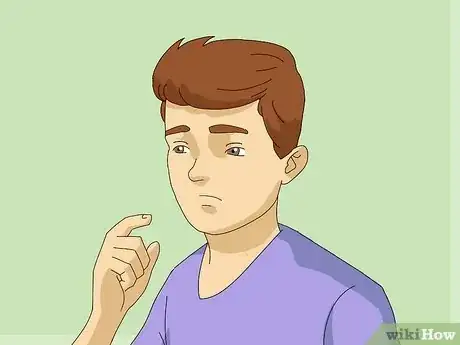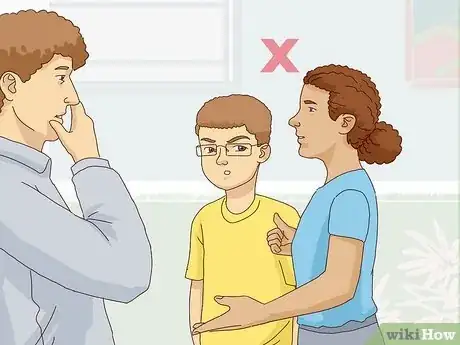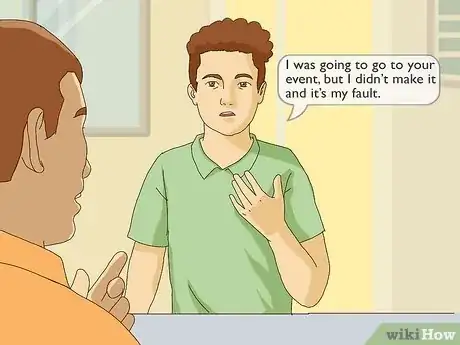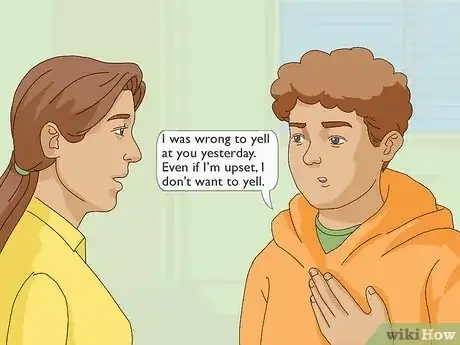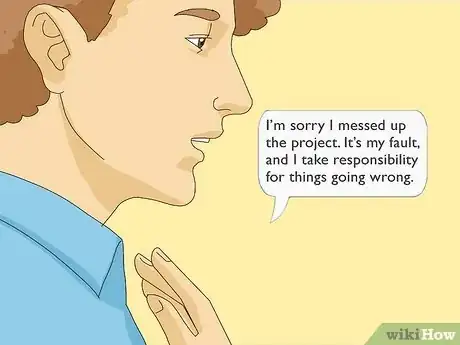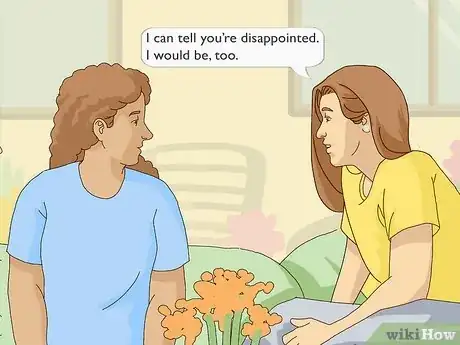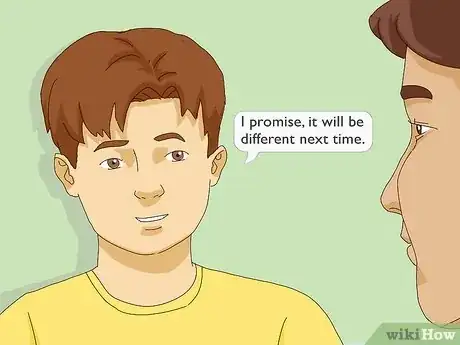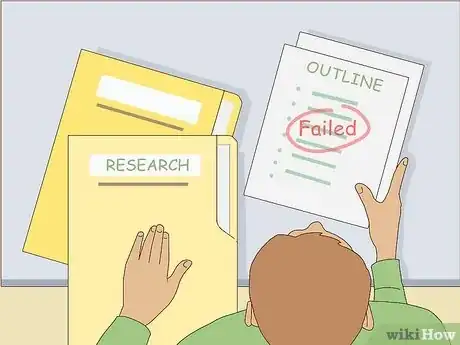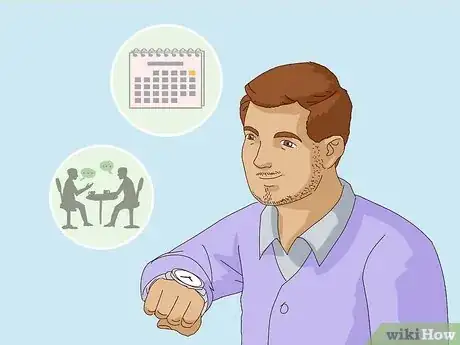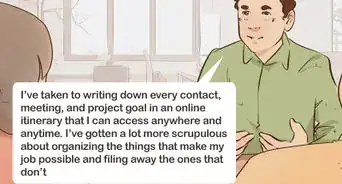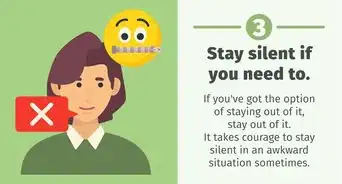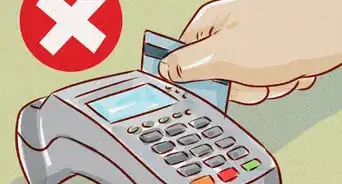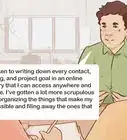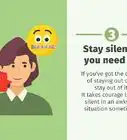This article was co-authored by Lisa B. Kift, MFT. Lisa B. Kift is a Licensed Marriage and Family Therapist (MFT) for California Online Therapy and Counseling and the Founder of Love and Life Toolbox, which offers tools for emotional health and relationships. With over 15 years of experience, Lisa specializes in family of origin work and relationship issues. In addition to being licensed with the California Board of Behavioral Sciences, Lisa has a Masters of Counseling Psychology from National University. She offers individual and couples counseling online for California residents or face-to-face in Larkspur, Marin County, CA. Lisa is a frequent consultant for the media and has written for news and other online resources such as CNN, HuffingtonPost, Shape, and MensHealth.
There are 9 references cited in this article, which can be found at the bottom of the page.
This article has been viewed 434,629 times.
When you know you are at fault for a problem, the mature and responsible thing to do is stand up and own up to the mistake, accept the consequences, and be part of the solution. Recognize where you went wrong and be prepared to fully own what you did. Talk to the person and tell them what went wrong and apologize. Then, move on from the situation, knowing you will do better next time.
Steps
Realizing Your Mistake
-
1Recognize you're wrong. To accept blame, you must acknowledge your wrongdoing. Reflect on your words or actions and know what you did poorly or wrongly. Gain some clarity about the event and why you may have done what you did.[1]
- Admitting you were wrong doesn't mean that you're weak or inept. In fact, being able to own up to your mistakes takes a lot of courage and self-awareness. It is a sign of maturity.
- For example, if you said you would pick up the dry cleaning but didn't, don't make an excuse. Just own that you said you would do something and you didn't pull through.
-
2Don't try to shift the blame. Keep the focus on you. You might share the blame and the other person may have said or done wrong things as well, but focus only on your part. Just because you accept your own blame doesn't mean you're free to blame other people for their parts.[2]
- If you own up to your part, the other person may not own up to theirs. Even if they don't, know that you did the right thing by admitting your wrongs. Remember that you can only control your own actions, not anyone else's.
- For example, if a project didn't get finished and you were part of the problem, own up to your part. Don't start blaming other people, even if they were part of the problem.
Advertisement -
3Say something sooner rather than later. Waiting to see how things shake out is a bad idea. As soon as a situation starts being unpleasant, own up to your responsibility in creating it. The sooner the problem is identified, the sooner a resolution is possible, and that minimizes consequences.[3]
- For example, if you let someone down, talk to them as soon as you can and let them know how you feel. Say, “I was going to go to your event, but I didn't make it and it's my fault.”
Speaking to the Person
-
1Admit that you were wrong. Admitting you were wrong shows that you're willing to accept that you are imperfect and make mistakes. It can be difficult to admit your wrongs, but doing so shows others that you're willing to take responsibility for what you do.[4]
- For example, say, “I was wrong to yell at you yesterday. Even if I'm upset, I don't want to yell.”
-
2Apologize. If the situation warrants one, make a sincere apology. Accept your wrong and make it clear that you are sorry for whatever hurt or problem it caused. Be gracious in your apology and willing to admit your fault.[5]
- For example, say, “I'm sorry I messed up the project. It's my fault, and I take responsibility for things going wrong.”
-
3Validate the person's feelings. If the other person is upset, be understanding. Validate how they feel and what they might be experiencing. Start by reflecting their words or feelings to show that you understand, and let them know that you understand their feelings.[6]
- For example, say, “I can tell you're disappointed. I would be, too.”
Moving Past the Event
-
1Propose a solution. Part of accepting blame and taking responsibility can include making up for your mistake. Come up with some solutions to right your wrong. This might mean putting in some extra work or promising to do better for next time. Whatever it is, show that you're willing to change to make things better. Making amends can help to restore justice and put people back on equal grounds.[7]
- For example, if you're to blame for something at work, offer to stay later and fix your mistake.
- If you mess something up with your family or friends, say that it will be different next time and mean it.
-
2Accept consequences. Accepting responsibility for your behavior may be scary, especially if you know there will be consequences. Take your consequences as courageously as possible, and when it's done, it's really over. You'll have learned your lesson and maintained personal integrity in the process. Try to grow from the experience and avoid repeating your mistakes.
- For example, coming clean might mean you face consequences at work or school. Or, you may have to fess up to something to your family or partner that you know will make them upset. You might know some backlash will happen, but do the right thing.
-
3Reflect on your behavior. Recognize your mistake and reflect on what may have contributed to it. Perhaps you had a stressful day and lashed out at someone. It is easy to displace your anger onto people who really had nothing to do with your bad mood. Perhaps you jumped to conclusions and were wrong. Whatever it is you did, think about it and try to make any necessary changes as a result.
- For example, if you forgot something because you were rushed, try to slow down or allow more time for activities.
-
4Get accountable. Have someone in your life who can help keep you accountable for your words and actions. This might mean you have a friend who calls you out or you meet with someone to talk about accountability. Having someone to talk to about taking responsibility can help you deal with it better and faster.[8]
- For example, meet with someone each week and talk about what you're doing well and what you're struggling with. Let each other know when the other needs to accept responsibility for wrongs.
-
5Move on from the situation. Nobody's perfect and everyone makes mistakes. Don't linger on a mistake or continuously try to make it up to the person you hurt. Once you've admitted your mistake and made amends, do your best to move on from the event. Even if you made a big mistake, don't guilt yourself forever. Accept what happened, learn from it, then move on.[9]
- Once you've taken all the steps to make things right, don't live in guilt or shame. Let go of what happened.
- If your guilt over what happened is causing you a lot of distress, or you just can't seem to move on, consider seeing a counselor to help you work through it.
Expert Q&A
-
QuestionI made a fake account on a social networking site and pretended to be an imaginary person. I said things to someone that I feel guilty about, but I told the person it was me. What should I do?
 Paul Chernyak, LPCPaul Chernyak is a Licensed Professional Counselor in Chicago. He graduated from the American School of Professional Psychology in 2011.
Paul Chernyak, LPCPaul Chernyak is a Licensed Professional Counselor in Chicago. He graduated from the American School of Professional Psychology in 2011.
Licensed Professional Counselor Seems like you already took responsibility for your actions. If they accepted your apology, you should take his as a learning experience and move on.
Seems like you already took responsibility for your actions. If they accepted your apology, you should take his as a learning experience and move on. -
QuestionWhen you feel you're in the right and the other person feels they're in the right, how do you come to a common solution?
 Paul Chernyak, LPCPaul Chernyak is a Licensed Professional Counselor in Chicago. He graduated from the American School of Professional Psychology in 2011.
Paul Chernyak, LPCPaul Chernyak is a Licensed Professional Counselor in Chicago. He graduated from the American School of Professional Psychology in 2011.
Licensed Professional Counselor You may just have to agree to disagree. You can let them know that you acknowledge their point of view but do not agree. However, if both of you are wrong, you can start by admitting your own mistake and taking responsibility for your part even if they don't take responsibility for theirs.
You may just have to agree to disagree. You can let them know that you acknowledge their point of view but do not agree. However, if both of you are wrong, you can start by admitting your own mistake and taking responsibility for your part even if they don't take responsibility for theirs.
References
- ↑ https://www.nbcnews.com/better/lifestyle/how-get-better-admitting-you-re-wrong-ncna1003356
- ↑ https://www.psychologytoday.com/us/blog/what-would-aristotle-do/201207/stop-playing-the-blame-game
- ↑ https://hbr.org/tip/2019/02/when-you-make-a-mistake-be-quick-to-admit-it
- ↑ https://www.psychologytoday.com/blog/happiness-in-world/201012/how-admit-youre-wrong
- ↑ https://www.psychologytoday.com/blog/worry-wise/201207/how-apologize
- ↑ https://www.psychologytoday.com/blog/pieces-mind/201204/understanding-validation-way-communicate-acceptance
- ↑ https://www.psychologytoday.com/blog/positive-psychology-in-the-classroom/201304/the-positive-psychology-making-amends
- ↑ https://www.psychologytoday.com/us/blog/happiness-is-state-mind/202102/the-difference-between-shame-and-accountability
- ↑ https://www.psychologytoday.com/blog/the-mindful-self-express/201703/8-empowering-ways-stop-feeling-guilty
About This Article
To accept blame when you deserve it, try to remember that recognizing you're wrong and being accountable makes you mature and responsible, not weak. If you did something wrong, talk to the person or people involved as soon as possible, and admit that you made a mistake. For example, you could say something like, "I was wrong to yell at you yesterday. Even if I'm upset, that's not OK." Then, apologize if the situation warrants one. After you've accepted the blame for something, try to offer a solution to make up for your mistake. For example, if you messed up at work, you could offer to stay late to fix the problem. For advice from our co-author, like how to gracefully accept the consequences of a mistake, keep reading.
